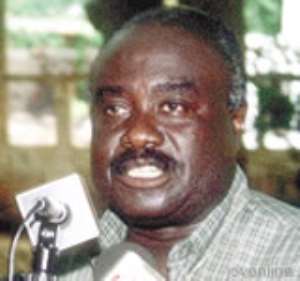
Acknowledged energy expert Dr. Charles Wereko-Brobby says as a nation, Ghana has spent too much time planning her development without implementing crucial decisions.
He has therefore asked government to effect energy plans devised over the years and spare the populace the recurring discomforts.
Dr. Wereko-Brobby, who is a former Chief Executive Officer of the Volta River Authority told Joy FM's Super Morning Show host Kojo Oppong-Nkrumah that he was not surprised at all with the country's current energy troubles but hoped the right decisions would now be taken.
“I think it's part of a very consistent pattern of planning and failing to execute plans and I hope that finally we will learn the lessons of what needs to be done, not just knowing what needs to be but doing what needs to be done.”
Dr. Wereko-Brobby, now CEO of Ghana@50 Secretariat said after the 1983 hydro problem when water in the Akosombo Dam went drastically down and caused a lot of social and economic consequences, a lot of lessons were learnt to inform strategic planning for the Energy sector.
The lessons that were learnt including a move away from depending on hydro power for the country's future energy needs, the institutionalisation of strategic planning processes and execution as well as the documentation of certain basic policies to serve as guides among others.
He said specific to the energy sector, “there was a notion that came and whose failed implementation is at the heart of the energy problems.
“The notion was that we should talk about thermal complementation of the hydro. Now thermal complementation recognised two major factors; first of all there was no question that hydro energy would continue to be the cheapest possible source of power generation in this country and so far as it was possible to generate from hydro we should continue to do that.”
Dr. Wereko-Brobby said however, the underpinnings of the thermal complementation was that there was need, if the nation was going to draw down the lake, to have in reserve capacity to generate energy from other sources even if it was going to cost more.
He said essentially that would have provided a back-up.
“Initially the thermal complementation was to then build 200 megawatts of thermal capacity, first of all to enable the lake to be drawn down as possible with a contingency but ultimately to become the bedrock of a mixed power generation system. So the building blocks of a coherent and strategically important energy and power sector policy has been there for almost 20 years. What has happened over the years has been the failure to implement plans, delays in implementing plans, political exigencies taking the place of proper technical and economic decisions and that has been the problem that we've faced for the last 19 years.”
Dr. Wereko-Brobby said it is not good enough to reduce everything done in the country to politics, admonishing that politics must take its proper place in society.
The former Chief Executive of VRA said the government has so far not shown realistic commitment to stop the load shedding exercise in the short term.
Dr. Wereko-Brobby said solutions put forward since the power crisis started in August last year are futuristic.
Dr. Charles Wereko-Brobby said he expected the government and energy managers to find a workable short term plan to end the load shedding.
He was therefore worried by the emphasis on the long term solution. The former VRA Boss said plans such as the Bui Dam construction and thermal plant installations will take at least three years, noting that Ghanaians need immediate remedies.
The government is importing some thermal generation plants to deal with the problems in the short term. He described the emergency power plants imported by government as toy machines saying more efficient ones could have been procured for the same purposes.




 Critics fear Togo reforms leave little room for change in election
Critics fear Togo reforms leave little room for change in election
 Flooding: Obey weather warnings – NADMO to general public
Flooding: Obey weather warnings – NADMO to general public
 Fire in NDC over boycott of Ejisu by-election
Fire in NDC over boycott of Ejisu by-election
 NDC to outdoor Prof Jane Naana Opoku-Agyemang as running mate today
NDC to outdoor Prof Jane Naana Opoku-Agyemang as running mate today
 Ejisu: CPP seeks injunction to stop April 30 by-election
Ejisu: CPP seeks injunction to stop April 30 by-election
 Dismiss ECG, GWCL, GACL bosses over losses – United Voices for Change tells gov’...
Dismiss ECG, GWCL, GACL bosses over losses – United Voices for Change tells gov’...
 Submit 2023 audited financial statements by May – Akufo-Addo order SOEs
Submit 2023 audited financial statements by May – Akufo-Addo order SOEs
 Current power outages purely due to mismanagement – Minority
Current power outages purely due to mismanagement – Minority
 ECG hoists red flag to fight Ashanti Regional Minister over arrest of General Ma...
ECG hoists red flag to fight Ashanti Regional Minister over arrest of General Ma...
 Mahama’s 24hr economy will help stabilise the cedi; it’s the best sellable polic...
Mahama’s 24hr economy will help stabilise the cedi; it’s the best sellable polic...
